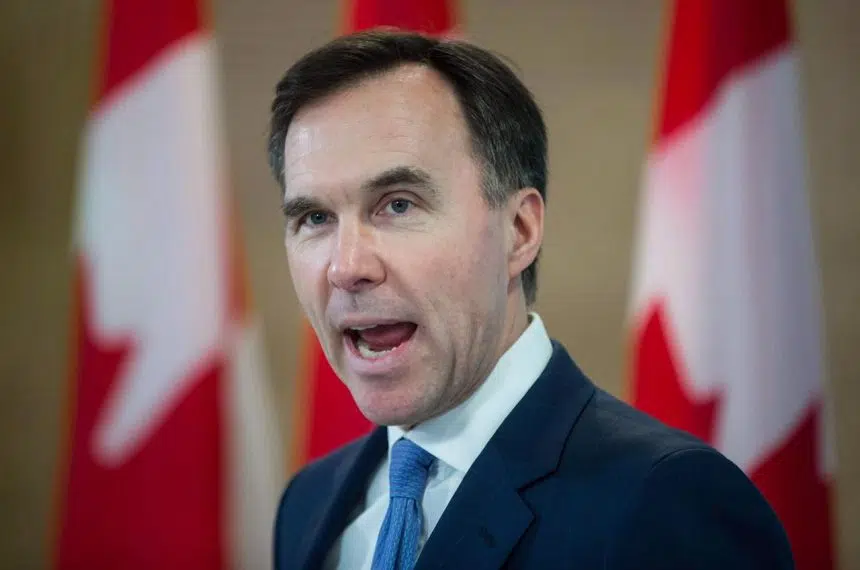OTTAWA — Alberta Premier Rachel Notley says Ottawa has promised specific action to try to break the impasse over the Trans Mountain pipeline, but federal Finance Minister Bill Morneau won’t say exactly what measures are on the table.
The two leaders met in Toronto on Wednesday, and Notley told reporters in a conference call afterward that she left feeling “a little bit more convinced” that the federal government would take specific action soon.
She declined to outline what those specific actions might be, saying that is something for Morneau to make public.
For his part, Morneau vowed to consider all options to get Kinder Morgan Inc.’s stalled pipeline project moving again, but he shed little light on what measures are on the table.
After what he called a “good” meeting with Notley, Morneau said the government is considering “legal, regulatory and financial” ways to ensure the $7.4-billion expansion project isn’t hampered any further.
The future of the Trans Mountain project was placed put in jeopardy this week when Kinder Morgan said delay tactics by the British Columbia government may make the expansion of the existing line financially untenable.
The company has suspended all non-essential work until May 31, saying the project won’t continue until the federal government intervenes in the ongoing tussle between B.C., Alberta and Saskatchewan.
Notley said the line, from Edmonton to Burnaby, is critical to getting more oil to the coast and fetching better prices to aid the Canadian economy.
She is introducing a bill next week to give her the power to turn down the oil taps to B.C., and says that will involve imposing new conditions on export licences.
“It would … allow us to direct the export of the product in a way that allows us to get the best price for the product and meets other generalized objectives,” said Notley.
“That could include a number of things, both restricting what goes in certain directions as well as suggesting certain mechanisms for it to be transported.”
Though some have suggested the federal government could take a monetary stake in the project to end the rift, Morneau would not comment on that possibility Wednesday, and said he wouldn’t be able to provide details on specific actions he is mulling over until discussions around the project are more advanced.
He also declined to detail what has been said in recent conversations between the government and Kinder Morgan.
Following an emergency federal cabinet meeting Tuesday in Ottawa, Morneau wouldn’t speculate on whether penalizing B.C. financially — such as by withholding transfer payments — remained an option.
“I’m not going to publicly negotiate with any one of the parties,” he said. “Public threats, in my estimation, aren’t helpful.”
The federal Liberal government granted approval of the project in 2016. Substantial work has not yet begun, however, thanks to protests from environmental groups and court challenges that aim to prevent construction.
Opponents of the pipeline fear potential spills along the B.C. coast, and argue that Indigenous communities have not given their consent to the project, violating their constitutional rights.
B.C. is also part of a lawsuit against Ottawa arguing there was not proper consultation with Indigenous communities or other stakeholders when the pipeline was reviewed. A decision in that case is expected any day.
More than 30 Indigenous communities along the pipeline’s route support the project, but many other communities in B.C. do not.
Federal NDP leader Jagmeet Singh has long stood in opposition to the project on the grounds that it was approved under what he calls flawed environmental assessment rules adopted by the previous Conservative government. He said Wednesday the Trudeau government should, in tandem with B.C., ask the Supreme Court for a reference to resolve what he calls jurisdictional issues.
It would be a much faster way of answering legal questions over jurisdiction than the lengthy court battles the B.C. government has threatened, said Singh.
“This is a way that would respect the concerns of all people, and it is much more efficient than what would happen otherwise, which is British Columbia having to go to a court in British Columbia, then potential appeals, then potentially to the Supreme Court,” Singh told a news conference in Ottawa.
The federal government has long maintained it holds full jurisdiction over natural resource projects that cross provincial boundaries — a stance Morneau reiterated this week — but the B.C. government disagrees, saying the potential environmental consequences give it authority that trumps Ottawa.
Tara Deschamps and Terry Pedwell, The Canadian Press











